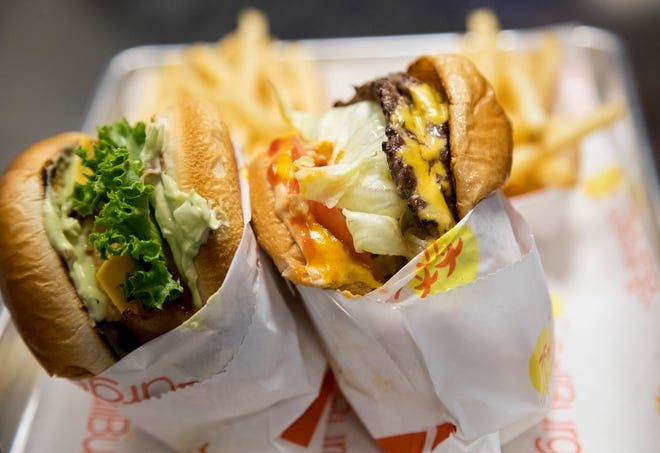When executive chef Jeffrey Kalt began explaining how CaliBurger came to be, a new phrase came to mind: reverse restaurant osmosis.
Normally, chains catch on in the United States and then migrate around the world, assimilating overseas second.
But there’s nothing normal about CaliBurger.
Inspired by In-N-Out Burger of California, which has more than 300 locations but does not franchise, CaliBurger started first in China and then the Middle East before setting up shop at the University of Washington for its first U.S. location in November 2018.
The burgers, fries, chicken sandwiches and shakes became available late last week at 19800 Village Center Drive at University Village, just north of Estero and off Ben Hill Griffin Parkway and near Estero Parkway.
The burgers will be flipped, and the fries will be fried, by a pair of robots. Both named Flippy, the robots take some of the grunt work and stresses away from the humans who build the burgers.
The tech-heavy chain is the brainchild of John Miller, who had no comment on dating a celebrity girlfriend, actress Jennifer Garner, but plenty to say about the umbrella of companies surrounding CaliBurger.
Miller has a stake in Pop ID, a brand of facial recognition software that will help the chain welcome repeat customers, who need only to approach the touch-screen kiosk during future visits after registering.
Miller has a stake in Super League Gaming, which eventually will allow CaliBurger customers to play Fortnite or Minecraft or other games online while eating in the store.
Miso Robotics is designing artificial intelligence and robots like “Flippy” to do more demanding work for less money than human counterparts. Robots are on the job at Cali Burgers in Pasadena and Dodgers Stadium in California and at the Arizona Diamondbacks baseball stadium in Phoenix. The robots began development in 2016, could flip burgers in 2017 and were first deployed commercially last year.
With Kitchen United, Miller started yet another company in anticipation of the rapid rise of food delivery services. CaliBurger will be directly connected to all four of these companies, an incubator for innovation in fast-casual dining.
“My background is in technology,” Miller said. “CaliBurger started off as a fun project. There’s a huge opportunity in innovating with the restaurant industry.
“We’ve spent the last seven years launching the technology to put into our restaurants. We build the technology. The world can see it. Then we reach out to other restaurant chains.”
Overseas, cheaper labor pools meant CaliBurger employees accounted for about 8% of operating expenses. Higher minimum wages in the U.S. meant for a tougher bottom line, with 40% of expenses going to the work force, which in fast food is tougher to retain.
“The issue in the U.S. is turnover,” Miller said. “People want to drive Ubers instead of working in a restaurant. We’re trying to make our workers happier. It’s all about trying to make our employees have happier smiles on their faces.
“The biggest cost we have is that we train, and then people leave after two weeks to do something else. Then we have to retrain.”
The robots are intended to supplement, not replace, jobs for humans, said Kalt, 60, who lives in Las Vegas, has been in restaurants since standing on a stepstool at age 10 and working for his father at the famed 21 Club in New York City.
“He doesn’t need a bathroom break,” Kalt said of Flippy. “He’s going to pass the drug test. He’s always going to be on time.”
The robot has a camera that captures thousands of images of the burger, which is cooked for about 60 seconds on one side and 120 seconds on the other. Flippy can change its own spatula and even clean the griddle with a scraper.
“But the other thing is we don’t want to reduce jobs, either,” Kalt said. “The person over here building the burger is still building the burger. The robots aren’t killing jobs. The robots are making the humans more efficient in their jobs.”
Miller and Kalt partnered with the same men who started Marlins Brewhouse with Chronic Tacos at 5611 Six Mile Cypress Commercial Court in Fort Myers.
Tim Frederic, who inherited nine area McDonald’s franchises from his late father and then sold them, bought the CaliBurger franchise rights for all of Florida with his business partner and friend, Jeff Burns.
“Just going out there, I took one bite of the burger and took one taste of the shake, and I just knew we had to do it,” Frederic said. He and Burns opened the first Marlins Brewhouse March 7, 2018. They’re bringing the same synergy to the second Marlins Brewhouse, located under the same roof with CaliBurger.
Stevens Construction spent the past four months building the interior of the 7,330-square-foot restaurant. There are at least a dozen craft beers on tap, and there is high-tech galore.
“Our goal is to franchise these throughout Florida,” Frederic said. “Here’s the future vision: A Marlins Brewhouse with a CaliBurger and a Chronic Taco and maybe a pizza place all under one roof. Moms and dads are happy. Kids are happy. There’s something for everyone. And for people at home, when they go on an app, they can order two or three different brands for takeout, and they all come out of one kitchen, in one car, and to one house. That’s really what’s happening with food delivery.”
Original Article: https://www.news-press.com/story/news/in-the-know/2019/12/03/cali-burger-opens-university-village-robots-flipping-frying-in-the-know/4240280002//

